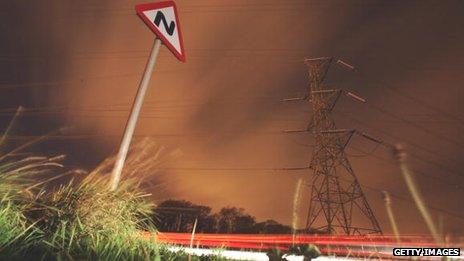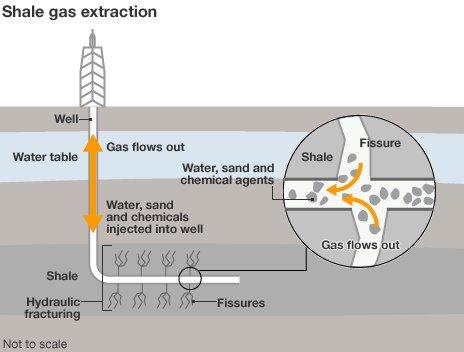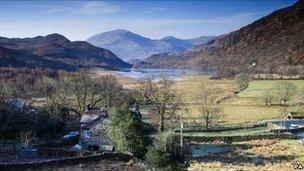Review of 2011: Energy fuels Welsh environment debate
- Published

Once power is generated, there needs to be a network to deliver it - like here at Aberthaw power station, Vale of Glamorgan
The main environment stories in 2011 have been about campaigners and protesters trying to engage government at local, Welsh and UK levels. Energy has been the main bone of contention.
What's devolved to Wales, and what's under Westminster control, is under scrutiny and the subject of political disagreements.
Energy and protecting landscapes have become major themes - opposing turbines and pylons in mid Wales, and gas drilling in south Wales.
While fracking is a term that has been used in the US and by conservationists keen to ban it, it is now a term with which many in the Vale of Glamorgan are familiar.
The term derives from hydraulic fracturing of rocks, to release gas deep underground. The "fracking" involves pumping water, sand and some chemicals at high pressure to fracture rocks, then piping the gas up to the surface.
It's the pressurised water and the use of chemicals, as well as the potential pollution of water supplies, which scares some residents of Cowbridge, Llantwit Major and Llandow.
Small earthquakes
Two small earthquakes in Lancashire last summer were "highly probably" triggered by shale gas drilling or fracking nearby, according to a British geological report.
Andy Chyba from the Bridgend Green Party feels Britain should ban hydraulic fracturing of rocks to release gas because of potential environmental dangers.
"You've got issues surrounding obviously things like the water contamination issues and the possible links with seismic activity," he said.
"They then go all the way to issues relating to the whole point of why we are squeezing the last drops of fossil fuels out of the ground, and contributing to global warming."
Gerwyn Williams, of Coastal Oil and Gas Limited, has applied for exploratory drilling permission, and not actual fracking, under an industrial estate in Llandow.
"If there is gas there, we will exploit that gas if we can and it will be for not only our benefit, but the benefit of the nation," he insisted.
"The message is, there is a huge amount of gas potentially in the UK and it can create both prosperity and security for the nation."

In mid Wales there's opposition to, potentially, hundreds of new turbines and new infrastructure proposals planned by the National Grid. That means miles of new pylons, 30m and 50m high, carrying electricity cables from Wales to England.
Wind farm policy
Jon Wilkinson, a farmer near Meifod, chairs the Montgomeryshire Against Pylons group and he and many of his neighbours oppose more wind farms as he claims they are inefficient.
More turbines he says, lead to new electricity pylons, and he firmly believes the Welsh government's TAN 8 (technical advice note number 8) policy is at fault, and needs reviewing.
"They seem very anxious to pass the buck to Westminster policy on renewables and not wanting to take responsibility at all for what is partly their business - it's the TAN 8 policy that certainly, initially, attracted the windfarm developments to Wales," he argued.
Both wind energy and drilling for gas partly involves the Welsh government, but ultimate authority on all energy projects larger than 50 megawatts lies in Westminster and the Department of Energy and Climate Change (DECC) .
The argument is whether the Cardiff administration's by now controversial policy of establishing seven areas to develop wind farms, as stipulated in TAN 8, actually plays a part in UK government decisions.

The National Trust raised £1m to save Llyndy Isaf in Snowdonia
According to First Minister Carwyn Jones, TAN 8 is no longer important, and he fears the UK government will overrule Welsh concerns.
The UK ministers say they will listen to local communities, but the TAN 8 policy and the need for more renewable energy are also factors in deciding where to build new turbines and new pylons. It's developing to be a political stand-off. Or a convenient route for politicians in Cardiff and London to blame another government.
'Green' farming
In more rural areas of Wales, the lack of broadband, and the rising cost of diesel angers many.
But most farmers dependent on grants to maintain family farms on what is called less favoured land - the uplands of Wales - are particularly concerned about the environmental aspects of CAP, the European common agricultural policy, and the Glastir scheme about to be introduced in January.
Gwyn Jones farms near Bow Street in Ceredigion, and says he's still undecided: "It's a lot of work," he said. "The returns are going to be really marginal for me.
"It's a five-year commitment and if you've got land on lease or anything, you've got to have it for five years - it's a big commitment."
It's been a year of campaigns elsewhere too. Commercial forestry companies lobbied in vain not to include the Forestry Commission with the Environment Agency and the Countryside Council for Wales in a new Welsh government environmental organisation which is to be announced in the new year.
Plastic bags
US firm Covanta pulled out of building an incineration plant near Merthyr Tydfil, partly possibly because of well-organised opposition in many nearby villages.
Elsewhere, people who live on the Vyrnwy Estate in mid Wales were told another water company is to be their new landlord.
The National Trust also successfully raised £1m to buy the Llyndy Isaf farmhouse in Snowdonia.
And during the Christmas holiday how many of us now carry our own plastic carrier bags to shop?
Quite possibly, more than before 1 October, when the new charge for single use bags was introduced in Wales.
All money raised is supposed to go to green causes - and we'll find out in the New Year how effective the policy is, and how much revenue actually goes to "green" causes.
- Published21 October 2011
- Published18 August 2011
- Published8 December 2011
- Published20 October 2011
- Published1 July 2011
- Published29 June 2011